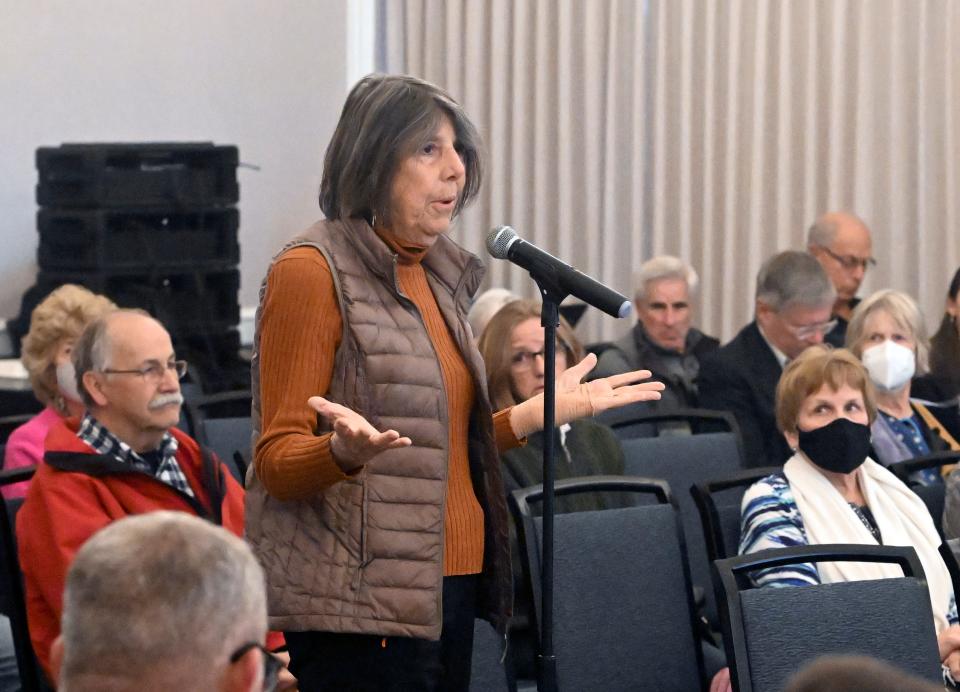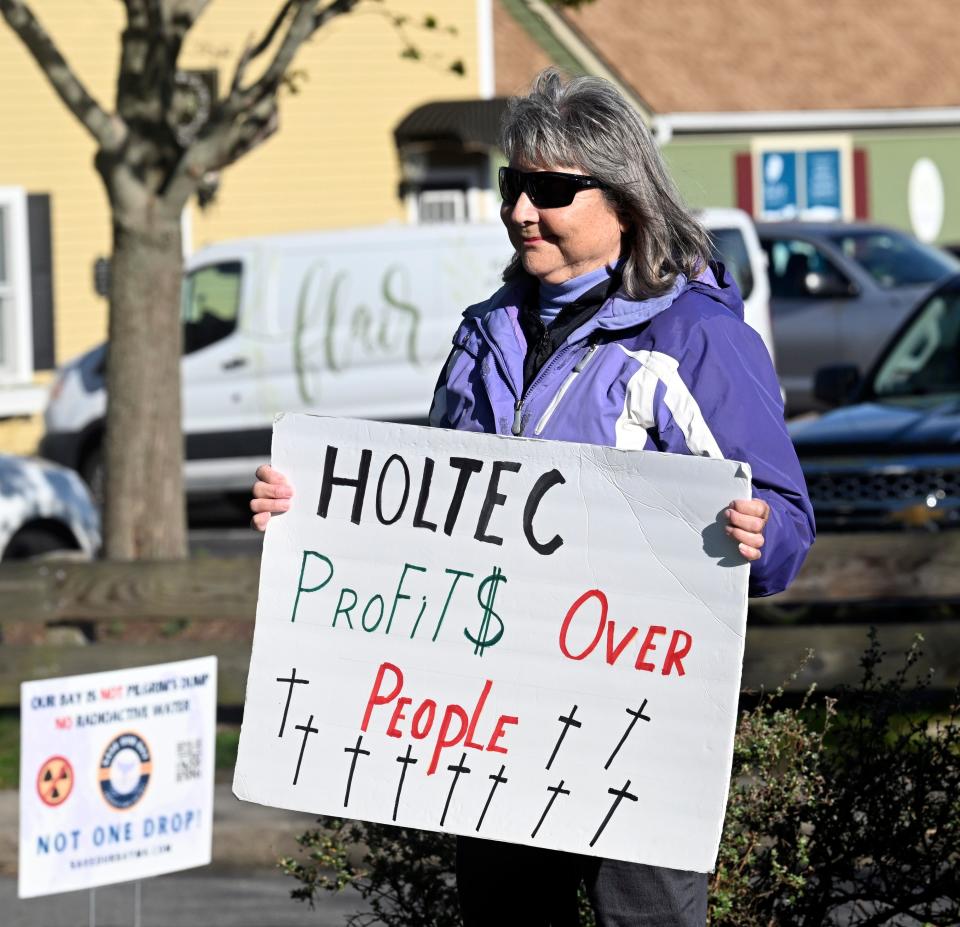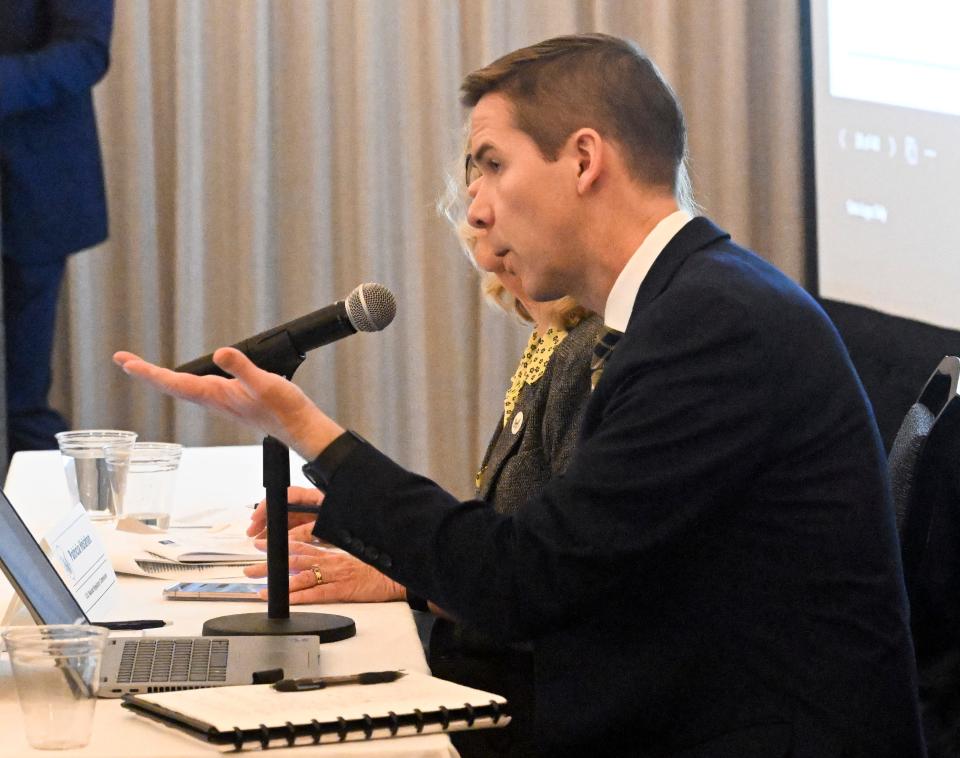New NRC rules cut corners, reduce oversight and leave out the public, critics say
Proposed guidance changes for decommissioning nuclear power plants unveiled by the Nuclear Regulatory Commission (NRC) drew further backlash across the board at a public meeting in Plymouth on Monday.
Protestors restated their opposition to plans of Holtec International Inc., the Florida company managing the decommissioning of Plymouth's Pilgrim Power Plant, to dump one million gallons of radioactively contaminated water from the now-closed power plant into Cape Cod Bay.
Daniel Doyle, the NRC's senior project manager for rulemaking of decommissioning nuclear reactors, and Howard Benowitz, legal counsel for the NRC, outlined proposed changes to an audience of about 100 people who attended both online and at the Hotel 1620 Plymouth Harbor.
Related: Trespassing case against antinuclear activist Diane Turco dismissed
The proposals include a new, graded approach to decommissioning nuclear facilities:
Level one facilities are those that have just shut down
Level two facilities are in the decay period, generally 10-16 months after shutdown
Level three facilities have moved their remaining spent fuel cells to dry cask storage
Level four are facilities whose waste has been moved off site and are considered completely offline
Several changes to emergency preparedness, physical and cyber security, environmental considerations and spent fuel management planning, among others, are proposed in line with the graded approach.
The changes are expected to streamline the decommissioning process for plant licensees and the NRC. If enacted, they would lessen physical and cyber security for plants as they move up the grades, from levels one to four, officials said.
As power plants move up the grades, they pose less of a threat. Those that have just shut down require more security than plants whose spent fuel is in dry cask storage, Doyle said at the meeting.
Other proposed changes included low-level waste transport, drug and alcohol testing for plant employees, certified fuel handlers, foreign ownership of plants, and decommissioning fund assurances.
The changes are also expected to reduce costs associated with emergency preparedness, drug- and alcohol-testing and decommissioning, Doyle said.
Questions and comments from the public
Members of Pilgrim Watch, a Pilgrim Power Plant watchdog group, kicked off public comment with critical remarks for the NRC's methods and plan to reduce its oversight.
“The NRC’s decommissioning process is backwards,” Pilgrim Watch Director Mary Lampert said. “They don’t approve (decommissioning) plans at the outset as they should, but at the end. Holtec’s proposal wouldn’t have been considered for one second if there was a federal review done beforehand. Not one drop. That’s what you’d learned if the process weren’t backwards.”

Henrietta Cosentino, a Plymouth resident and antinuclear activist, said the NRC presentation was “bureaucratic gobbledygook.”
“There is an overlooked point that is so fundamental. The ocean does not belong to Holtec and it does not belong to the NRC. It’s a common," she said. "We really have a sovereignty issue here."
Cosentino and Diane Turco, director of Cape Downwinders, both addressed NRC representatives regarding Holtec’s plan for Cape Cod Bay.
$42.5 million: coming to Cape for water resource projects
Turco mentioned an existing NRC rule, CFR 20.1310 F, that enables the NRC to impose restrictions on liquid radioactive releases from plants.
“We’re asking you to use this regulation,” she said. “You said you wanted public comment, well we’re saying it now. We are asking you to implement it now.”
Bruce Watson, chief of the NRC’s reactor decommissioning branch, said there is no “firm safety basis” on which to implement the restriction and prevent Holtec from discharging into the bay.
Joanne Corrigan, a Plymouth resident who lives near the plant, told the NRC she lost trust in the organization long ago.

“The NRC wants to increase transparency and public trust. Is that a joke?” she asked. “I’ve had no trust in the NRC since the plant had been in the degraded condition category year after year and all we were told is it would be fixed when they got to it.”
Christine Danielson, representing the Massachusetts Seafood Collaborative and Citizens for Climate Change, shared her personal story relating to nuclear safety — her grandfather, who lived in Woburn, died from non-Hodgkin's lymphoma which she said was caused by living near a power plant.
“How do you plan on addressing the public health crisis radioactive dumping in the bay would cause in our community?” Danielson asked.
“We are doing the best we can with the info we have,” Doyle responded.

“Before or after dumping?” Danielson returned.
“We believe we’re protecting the public,” he said.
“If it gets dumped we invite you all to a New England clambake,” one man called to the NRC representatives as the meeting ended. “Bring your family and your loved ones and take a swim where just dumped nuclear water.”
Officials give comment
Jim Cantwell, state director for Sen. Ed Markey, D-Mass., provided a statement on Markey's behalf indicating that public safety must be the primary concern.
On May 6, Markey, along with Rep. William Keating, D-MA 9th, and Sen. Susan Moran, D-Plymouth and Barnstable, held a congressional subcommittee hearing at Plymouth Town Hall discussing the NRC’s proposed changes.
Sen. Markey's congressional hearing on nuclear decommissioning in Plymouth gets commitment
The lawmakers weren’t impressed, and Cantwell reiterated these sentiments on Monday.
“The hearing last Friday made clear that there needs to be stronger decommissioning rules,” he said. “The current version of the rule cuts out public opinion until it’s too old or too late. Throw out this proposed rule and make a stronger rule instead. ”
Olivia Texeira, a staffer for Sen. Elizabeth Warren, D-Mass., read a statement indicating that the NRC’s rule proposals ignored calls for more community input and transparency. They also, she said, enable plant operators to cut corners.
Protesters assembled outside before the NRC meeting
Before the meeting, antinuclear activists from the Cape and the South Shore gathered outside the hotel. Turco; senator and candidate for governor Sonia Chang-Diaz, D-Suffolk 2nd; Cantwell, and several other community members addressed the protesters.
Turco, a longtime critic of the plant whose 2018 trespassing case on Pilgrim grounds had been dismissed that day, expressed her frustration about the dismissal.

“Charges were dismissed against me this morning when we’d spent three-and-a-half years building a case. They didn’t want to hear it because they didn’t want to hear the truth,” she said. “But we’re not going away. No way in our bay, not one drop.”
“I stand in solidarity with you to prevent Holtec from dumping into Cape Cod Bay,” Chang-Diaz said. “It’s bad for the community and bad for health. The NRC has repeatedly broken your trust again and again, they need to listen to the public outcry to reverse this decision.”
Earlier this year: Cape town leaders oppose radioactive water release in Cape Cod Bay, in letters filed at hearing
Plymouth resident Paul Quintal, who operates a private vessel charter out of Plymouth Harbor, and Olivia Michaud, a commercial fisherman out of Plymouth and Sandwich, identified the support the antinuclear activists have from the fishing community.
“Little by little we’re gaining traction. We need to protect our natural resources,” Quintal said. “My grandchildren live three miles from the plant, so this is personal for me.”
“Holtec says that the science says the water is safe, but science is always changing,” Michaud said. “Even if dumping doesn’t physically hurt us, there will be an economic impact and harm the fishing community. If we can’t sell our catch we will lose our businesses we’ve worked so hard for.”
This article originally appeared on Cape Cod Times: NRC faced backlash at a public meeting in Plymouth on proposed changes

